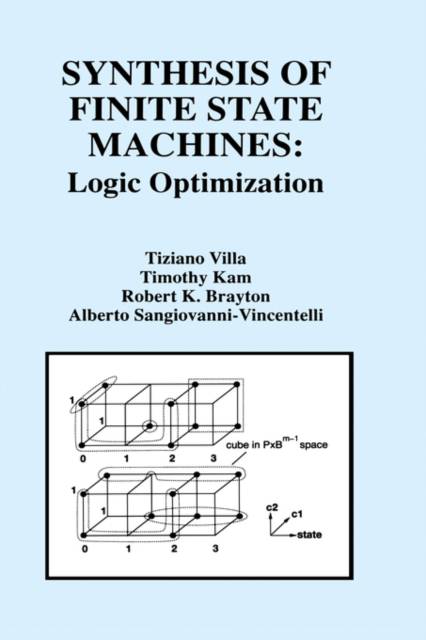
- Retrait gratuit dans votre magasin Club
- 7.000.000 titres dans notre catalogue
- Payer en toute sécurité
- Toujours un magasin près de chez vous
- Retrait gratuit dans votre magasin Club
- 7.000.0000 titres dans notre catalogue
- Payer en toute sécurité
- Toujours un magasin près de chez vous
Synthesis of Finite State Machines
Logic Optimization
Tiziano Villa, Timothy Kam, Robert K Brayton, Alberto L Sangiovanni-Vincentelli
Livre relié | Anglais
181,95 €
+ 363 points
Format
Description
Synthesis of Finite State Machines: Logic Optimization is the second in a set of two monographs devoted to the synthesis of Finite State Machines (FSMs). The first volume, Synthesis of Finite State Machines: Functional Optimization, addresses functional optimization, whereas this one addresses logic optimization. The result of functional optimization is a symbolic description of an FSM which represents a sequential function chosen from a collection of permissible candidates. Logic optimization is the body of techniques for converting a symbolic description of an FSM into a hardware implementation. The mapping of a given symbolic representation into a two-valued logic implementation is called state encoding (or state assignment) and it impacts heavily area, speed, testability and power consumption of the realized circuit.
The first part of the book introduces the relevant background, presents results previously scattered in the literature on the computational complexity of encoding problems, and surveys in depth old and new approaches to encoding in logic synthesis.
The second part of the book presents two main results about symbolic minimization; a new procedure to find minimal two-level symbolic covers, under face, dominance and disjunctive constraints, and a unified frame to check encodability of encoding constraints and find codes of minimum length that satisfy them.
The third part of the book introduces generalized prime implicants (GPIs), which are the counterpart, in symbolic minimization of two-level logic, to prime implicants in two-valued two-level minimization. GPIs enable the design of an exact procedure for two-level symbolic minimization, based on a covering step which is complicated by the need to guarantee encodability of the final cover. A new efficient algorithm to verify encodability of a selected cover is presented. If a cover is not encodable, it is shown how to augment itminimally until an encodable superset of GPIs is determined. To handle encodability the authors have extended the frame to satisfy encoding constraints presented in the second part.
The covering problems generated in the minimization of GPIs tend to be very large. Recently large covering problems have been attacked successfully by representing the covering table with binary decision diagrams (BDD). In the fourth part of the book the authors introduce such techniques and extend them to the case of the implicit minimization of GPIs, where the encodability and augmentation steps are also performed implicitly.
Synthesis of Finite State Machines: Logic Optimization will be of interest to researchers and professional engineers who work in the area of computer-aided design of integrated circuits.
The first part of the book introduces the relevant background, presents results previously scattered in the literature on the computational complexity of encoding problems, and surveys in depth old and new approaches to encoding in logic synthesis.
The second part of the book presents two main results about symbolic minimization; a new procedure to find minimal two-level symbolic covers, under face, dominance and disjunctive constraints, and a unified frame to check encodability of encoding constraints and find codes of minimum length that satisfy them.
The third part of the book introduces generalized prime implicants (GPIs), which are the counterpart, in symbolic minimization of two-level logic, to prime implicants in two-valued two-level minimization. GPIs enable the design of an exact procedure for two-level symbolic minimization, based on a covering step which is complicated by the need to guarantee encodability of the final cover. A new efficient algorithm to verify encodability of a selected cover is presented. If a cover is not encodable, it is shown how to augment itminimally until an encodable superset of GPIs is determined. To handle encodability the authors have extended the frame to satisfy encoding constraints presented in the second part.
The covering problems generated in the minimization of GPIs tend to be very large. Recently large covering problems have been attacked successfully by representing the covering table with binary decision diagrams (BDD). In the fourth part of the book the authors introduce such techniques and extend them to the case of the implicit minimization of GPIs, where the encodability and augmentation steps are also performed implicitly.
Synthesis of Finite State Machines: Logic Optimization will be of interest to researchers and professional engineers who work in the area of computer-aided design of integrated circuits.
Spécifications
Parties prenantes
- Auteur(s) :
- Editeur:
Contenu
- Nombre de pages :
- 381
- Langue:
- Anglais
Caractéristiques
- EAN:
- 9780792398929
- Date de parution :
- 30-04-97
- Format:
- Livre relié
- Format numérique:
- Genaaid
- Dimensions :
- 156 mm x 234 mm
- Poids :
- 739 g

Les avis
Nous publions uniquement les avis qui respectent les conditions requises. Consultez nos conditions pour les avis.






